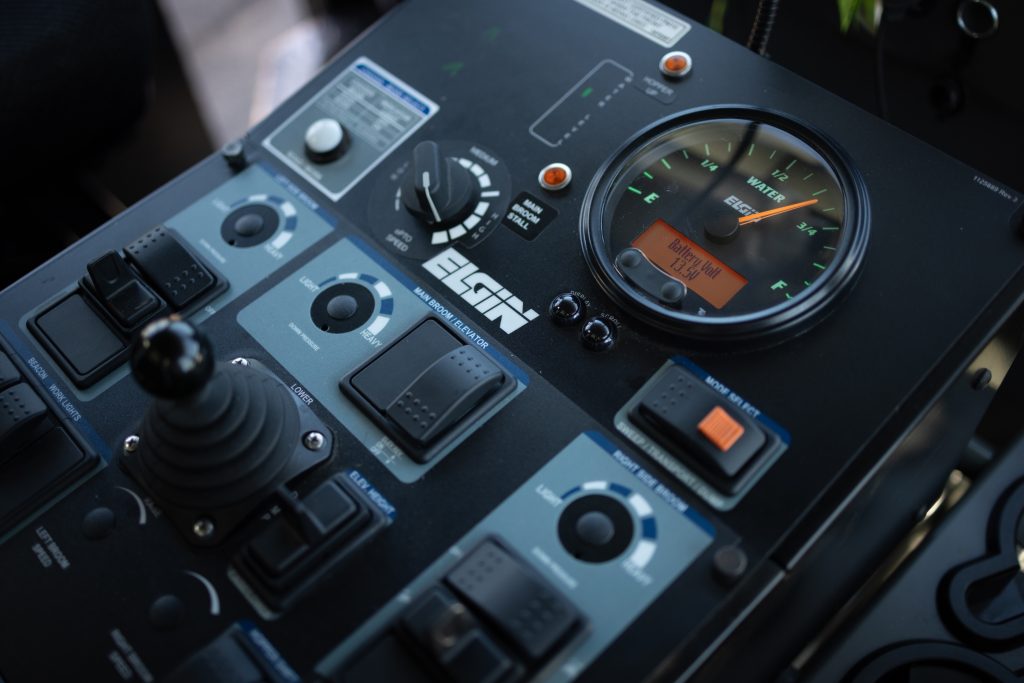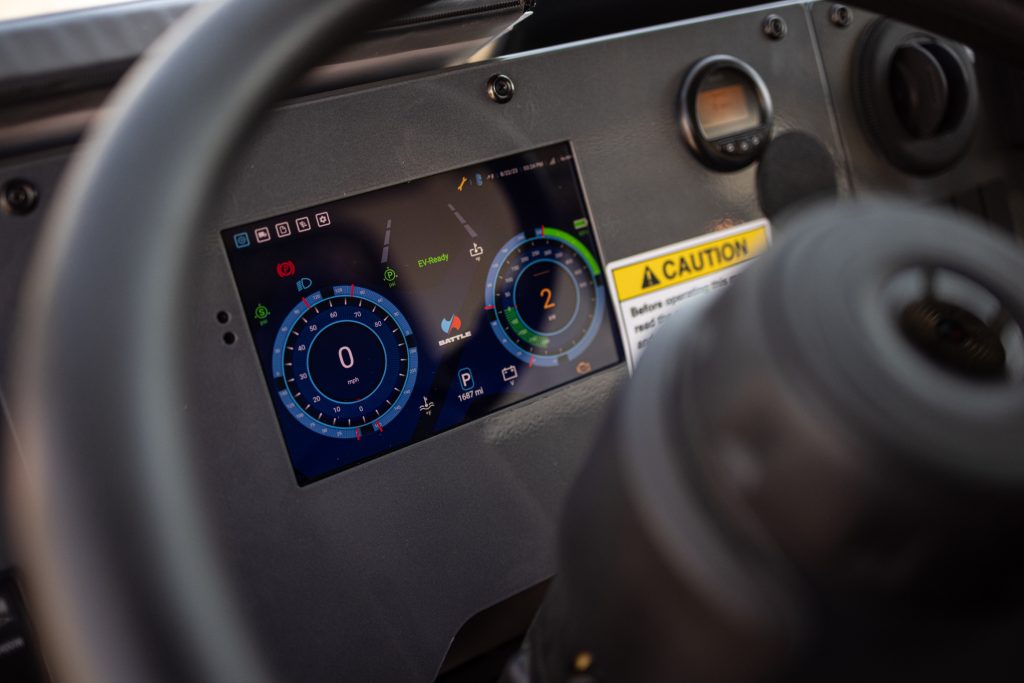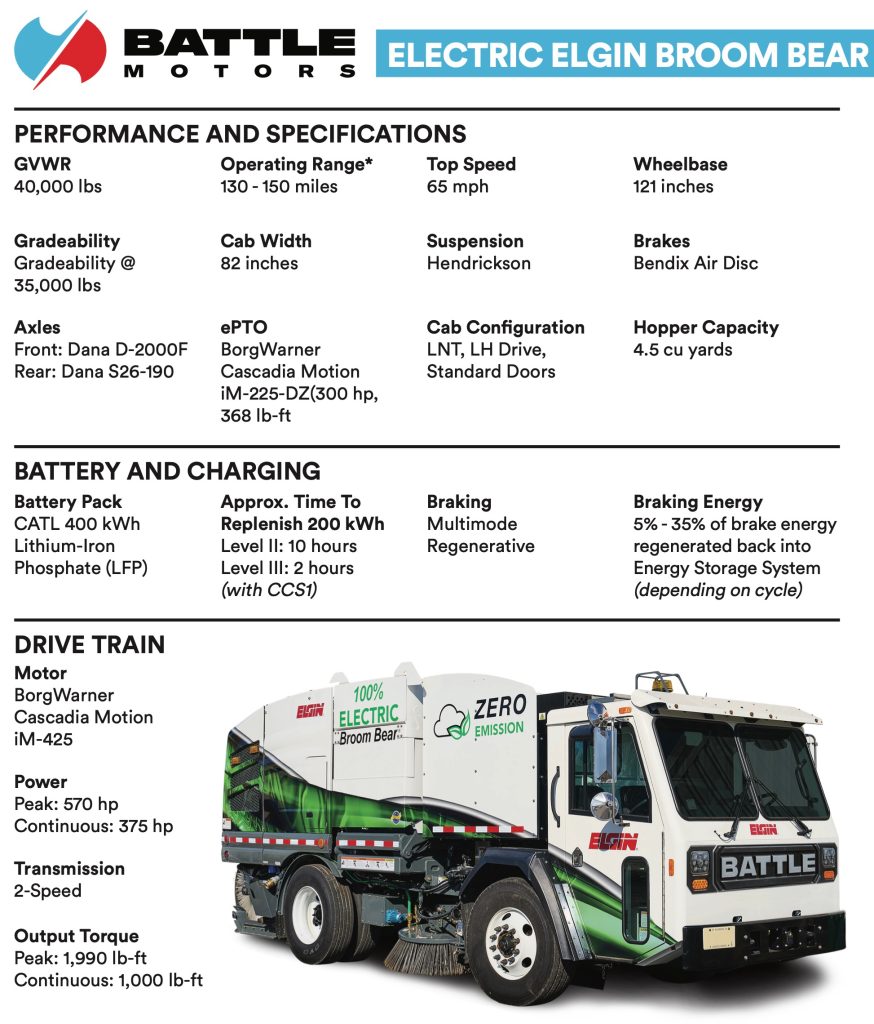
Battle Motors and Elgin Sweeper Company have collaborated to put the first all-electric street sweeper into service in the US, and we got to drive it.
The city of Los Angeles unveiled the new electric sweeper last month, and it’s putting it into service this year, mainly in a test capacity to see how it would work in the city’s fleet. The city has committed to transition to 100% clean energy by 2035, and this is part of that effort.
While the vehicle was unveiled just a couple of weeks ago, it’s been touring around various expos, touting its existence as the first all-electric street sweeper to be put into service in the US. We got to take it for a spin around the parking lot at Irwindale Speedway during an event put on by Velocity Truck Centers, a commercial truck dealer network that serves the Southwest US and distributes Battle Motors’ electric trucks. (We also drove Battle Motors’ electric garbage truck at the same event.)
Unlike the garbage trucks, we only took the street sweeper for a quick spin around the parking lot. There weren’t a lot of surprises; it felt and sounded about like what you’d expect a street sweeper to be like.
We did notice a little quirk where the powertrain seemed to have significant inertia in it – on short, hard acceleration-then-braking events, the truck would keep accelerating for a moment after letting off the accelerator. This isn’t likely to come up often in a large vehicle that mostly does consistent low speeds, but it’s something for drivers to be aware of (or for Battle to perhaps iron out in the software).
Given that this is the first electric street sweeper to go into service, fleet managers haven’t had many chances to see how they work. So events like these let them get behind the wheel and see it work in person – just to prove that, yes, these trucks do work fine, have plenty of power to get around, can push dust just as well as the diesel versions can, and so on.





Elgin, who built the body on Battle Motors’ chassis, mentioned that one benefit of an electric powertrain is the ability to customize drive software for easier operation. Sweepers like to do slow, consistent speeds, and software can be configured to automatically creep at whatever speed the operator wants, which isn’t so easy in a diesel truck. Elgin said they can put in other software customizations depending on the buyer’s needs.
For drivers, the lack of vibration from the engine can help make driving easier on the body. And, of course, the lack of pollution from a tailpipe is a major benefit for workers and neighborhoods alike.
That said, some benefits of electric drive are less pronounced with street sweepers. For example, while electric trucks are quieter due to the lack of a diesel engine, much of the noise from a street sweeper comes from brushes on the road, so only one source of noise is removed in this case.
Battle Motors’ philosophy has been not to shake the boat too much when it comes to laying out powertrain parts, choosing to mount the motor up front and deliver power to the axles through a driveshaft rather than an e-axle. For the street sweeper, the rear end is a much dirtier place, with lots of gunk and grime as well as water spraying all over the place, so they figured it would be wise to keep more sensitive components away from the part of the vehicle that is likely to experience the most corrosion.
This expands to other choices in vehicle design, like using hydraulic power steering instead of electronic. While electronic power steering is generally simpler and cheaper to implement, in a time when EVs will necessarily only be part of a fleet (so far), it makes it easier for fleet mechanics to work on alternate powertrains when the rest of the vehicle’s parts are similar.

The Battle Motors/Elgin Electric Broom Bear comes at a cost of over $800,000. This is double the price of a diesel street sweeper but is actually about $100,000 cheaper than the hybrid CNG-electric sweepers LA purchased last year.
While this is quite a big price jump, the electric sweeper will have lower fuel and maintenance costs, will qualify for both federal and state incentives, and will also produce less pollution.
Heavy-duty vehicles produce more than their fair share of pollution, and taking this pollution out of communities where people live comes with great benefits for a city. We’ve already seen improvements in air quality from higher electric car use in Los Angeles specifically, so the city knows that there are greater benefits to EVs than just fuel savings.
Author: Jameson Dow
Source: Electrek



